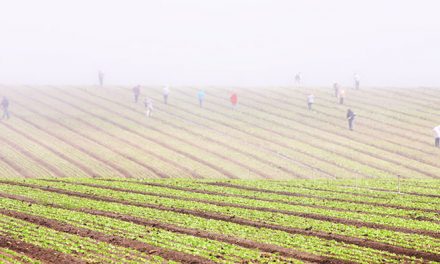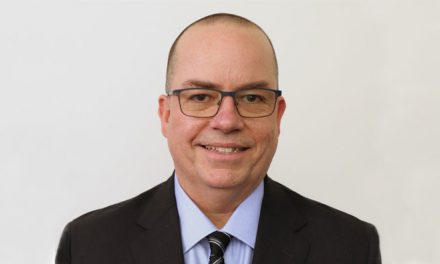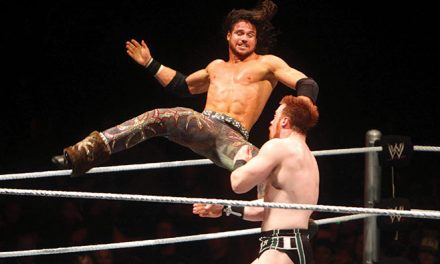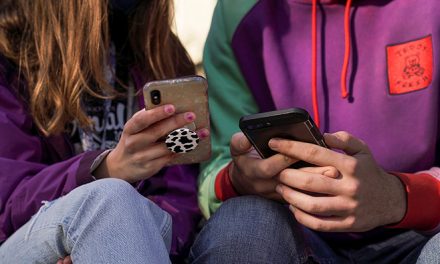He got right to the point in that March 20 letter: “Last night, as you know, Gov. Gavin Newsom issued a stay-at-home order for the entire state. The day before, we announced we were suspending operations, meaning most of our employees should already be at home where the governor wants you to be, and where we want you to be, for the sake of your own health and to help limit the spread of the coronavirus.”
The letter also brought news of the first case of COVID-19 at the university (an employee at UC Davis Health), provided information on remote instruction for the spring quarter, told students about a laptop loaner program, and advised employees about teleworking options and paid administrative leave.
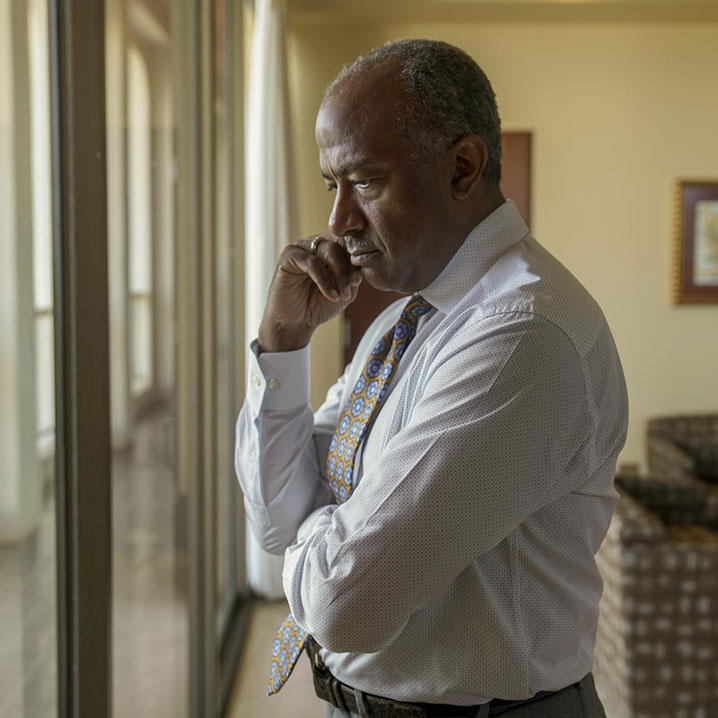
UC Davis Chancellor Gary S. May (Gregory Urquiaga/UC Davis)
“We will get through this, together.”
Indeed, that is exactly what we have done, amid all the disruption to our lives and work, all while grieving the pandemic’s death toll.
“The loss of life is heartbreaking,” Chancellor May said. “But we can be so very proud of UC Davis’ role in COVID-19 patient care, research, outreach, testing and vaccination programs — knowing that we are giving our all to fighting this virus.”
At the same time, he said, “We have come together as a community to take care of one another during these historic times. Our students, staff and faculty give me hope as we prepare to welcome everyone back in the fall.”
Here is a timeline of events and reports leading up to the suspension of campus operations, and what has transpired since then:
JANUARY 2020
Jan. 21 — UC Davis publishes a list of our experts who can comment on the novel coronavirus. One of them becomes a household name in the media: Dean Blumberg, chief of pediatric infectious diseases at UC Davis Children’s Hospital.
Jan. 30 — The UC Office of the President advises university affiliates to avoid all nonessential travel to China, based on federal guidance.
FEBRUARY 2020
Feb. 25 — UC Davis launches a coronavirus website with information on the virus and campus operations.
Feb. 26 — UC Davis Health announces it is treating the first apparent case of COVID-19 acquired by community spread.
Feb. 26 — UCOP issues a directive for faculty, staff and students to avoid all nonessential travel to countries with a CDC Warning-Level 3 Travel Notice.
Feb. 27 — Three UC Davis students are in quarantine or isolation after one of them may have been exposed to the coronavirus and subsequently exposed the other two. Yolo County Public Health reported two days later the first student had tested negative. The other two had been released from isolation.
Feb. 27 — UC Davis announces sanitizing and physical distancing measures.
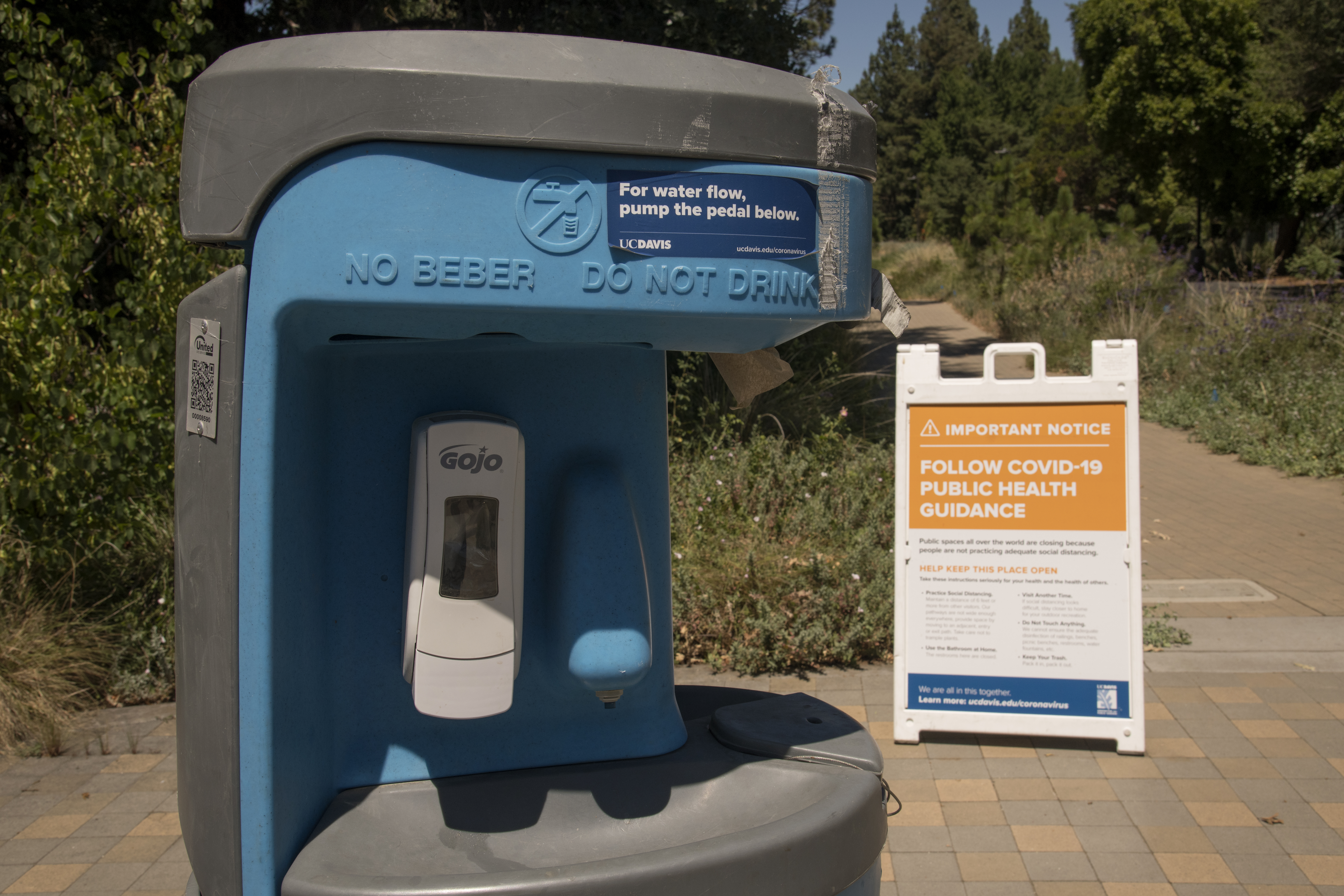
A hand washing station on a trail in the Arboretum. (Gregory Urquiaga/UC Davis)
MARCH 2020
March 6 — Yolo County confirms first positive case of COVID-19.
March 7 — UC Davis leaders issue a letter confirming there are no COVID-19 cases on the Davis campus and adding that, after careful review and consultation with health experts, the campus will not mandate the cancellation of in-person instruction the week of March 9 (the week before finals). “However, we are advising maximum flexibility and encouraging faculty or students who either should not or do not wish to attend in-person classes to complete the work of the quarter via alternate means.”
March 11 — The World Health Organization declares COVID-19 a global pandemic.
March 11 — UC Davis issues guidelines to continue research operations.
March 11-12 — UC Davis bans spectators from sports and one day later suspends winter and spring sports.
March 12 — Chancellor May joins with Academic Senate Chair Kristin Lagattuta in announcing the cancellation of in-person finals.
March 14 — Chancellor May announces remote instruction for spring quarter.
March 15 — Attendance cap for campus events lowered to 50.
March 16-20 — The administration allows maximum flexibility for final exams, to be held remotely.
March 16 — UC Davis suspends study abroad programs.
March 17 — UCOP releases guidelines for paid leave.
March 17 — City of Davis issues shelter-in-place guidelines.
March 18 — Yolo County and Sacramento County issue shelter-in-place orders.
March 18 — Chancellor May announces suspended operations.
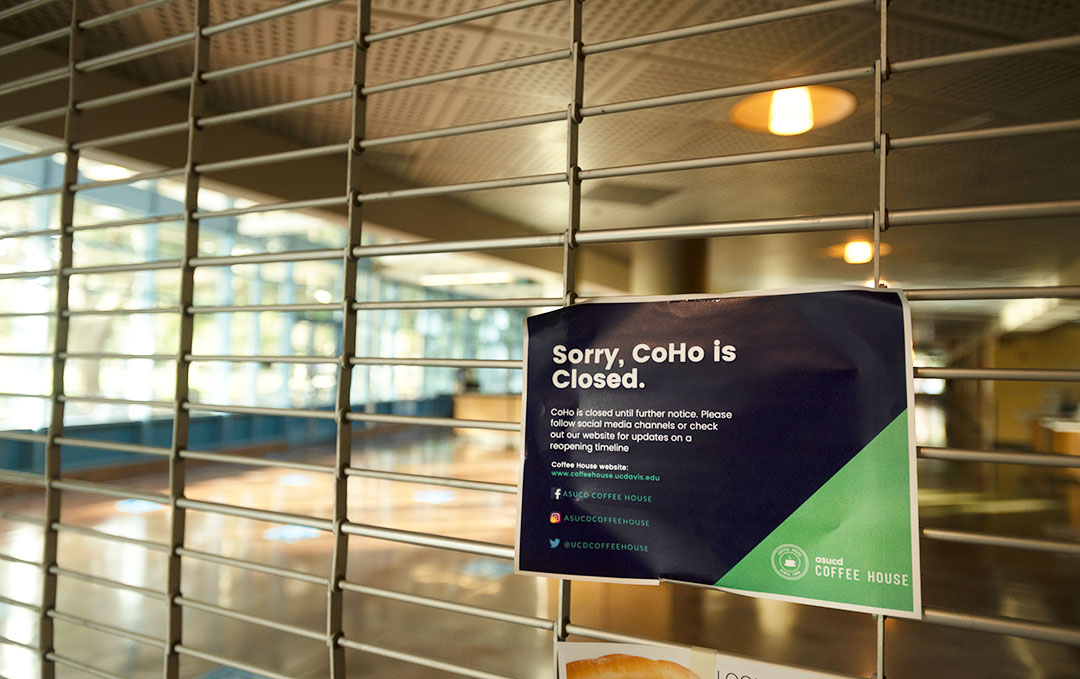
(UC Davis)
March 26 — UC Davis Health announces two clinical drug studies to treat COVID-19.
March 31 — Yolo County extends shelter-in-place order to May 1.
APRIL 2020
April 8 — UC Davis announces spring commencements will be virtual.
April 17-18 — In this unprecedented time, Give Day, a virtual event this year, raises a record $2.5 million.
April 18 — UC Davis hosts virtual Picnic Day.
April 23 — Distinguished Professor Walter Leal holds the first in a series of COVID-19 public awareness symposia.
April 27 — Yolo County orders people to wear face coverings in public.
April 30 — Yolo County extends shelter-in-place order to May 31.
MAY 2020
May 7 — UC Davis LIVE makes its debut, a biweekly livestream with experts on issues surrounding the coronavirus. Deans Discuss: COVID-19, a video podcast with Allison Brashear, School of Medicine, and Michael Lairmore, School of Veterinary Medicine, would debut later in the month.
May 26 — UC Davis Magazine publishes a series of Pandemic Portraits, featuring members of the UC Davis community sheltering in place.

May 29 — Yolo County announces end of shelter-in-place order.
JUNE 2020
June 2 — Davis campus moves to “reduced operations,” a step up from “suspended.”
June 16 — UC Davis will welcome back students for fall 2020 if county and state health guidelines permit, and plans to offer a mix of in-person and remote instruction.
JULY 2020
July 31 — UC Davis drafts a new Emergency Public Health Policy to bolster compliance with public health measures. “I know these efforts are only effective when we as a community do them together,” the chancellor writes in his Friday letter. “I also know the Aggie community is strong and I am proud to be a part of the effort to stop the spread.”
AUGUST 2020
Aug. 21 — Campus Ready plan is unveiled.
Aug. 28 — Daily Symptom Survey now required.
SEPTEMBER 2020
Sept. 4 — UC Davis is hiring up to 250 students to be Aggie Public Health Ambassadors, models of healthy behavior who will be deployed at high-traffic locations across campus asking bare-faced passersby to cover up.
Sept. 18 — The campus and the city of Davis establish the Healthy Davis Together partnership to help prevent outbreaks when thousands of students take up residence for the new academic year. Says Chancellor May: “We developed a plan that has components around technology, epidemiology and, more importantly, modifying behavior. Not just students but all community members.”
Sept. 21-24 — Campus housing welcomes students for Moove-In, but only after they are tested for COVID-19. This marks the beginning of the asymptomatic testing program that will go on to receive national attention. To date, the program has analyzed more than 420,000 saliva samples from campus and community.
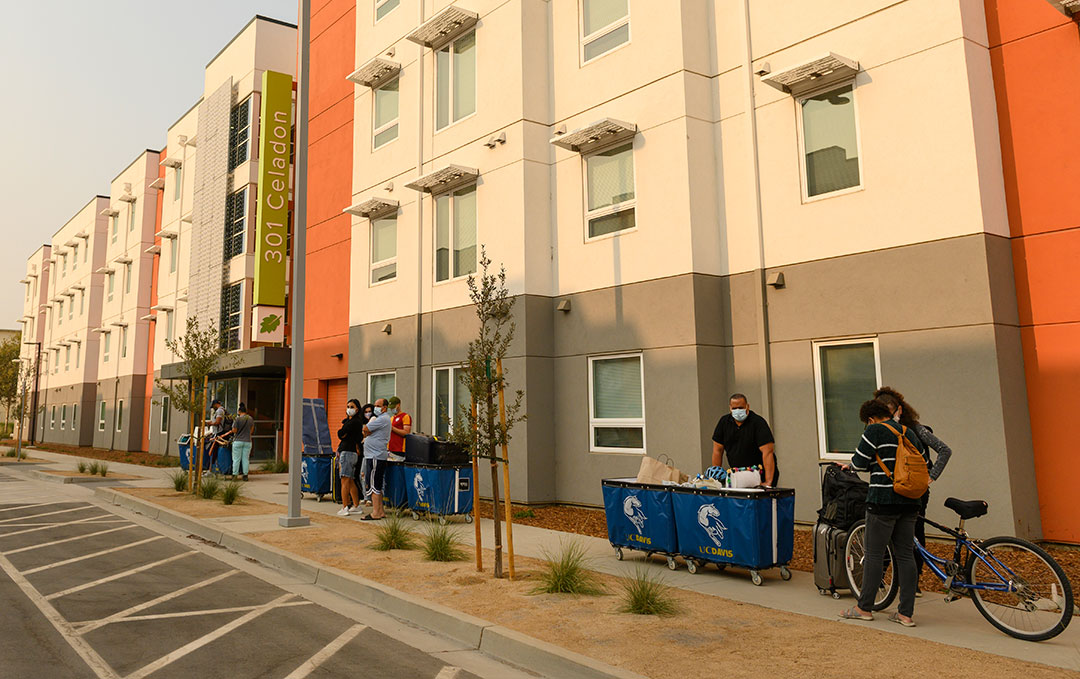
Sept. 30 — Yolo County moves up from purple to red tier in state’s coronavirus reopening plan. Select indoor operations may resume.
OCTOBER 2020
Oct. 7 — UC’s prohibition on all nonessential university international travel remains in place. Requests for international travel must be submitted three weeks before departure date. Domestic travel is strongly discouraged
Oct. 16 — UC Davis launches its COVID-19 dashboard.
Oct. 16 — Chancellor May announces fall commencements will be virtual.
Oct. 31 — Students celebrate Halloween safely, within their own households, with Healthy Davis Together grants to pay for costumes and decorations and such activities as pumpkin carving. More than 600 students applied for the grants, for activities involving some 2,500 students.
NOVEMBER 2020
Nov. 6 — UC Davis’ saliva-based system of asymptomatic testing has been validated, thus ending the need for duplicate testing by nasal swab.
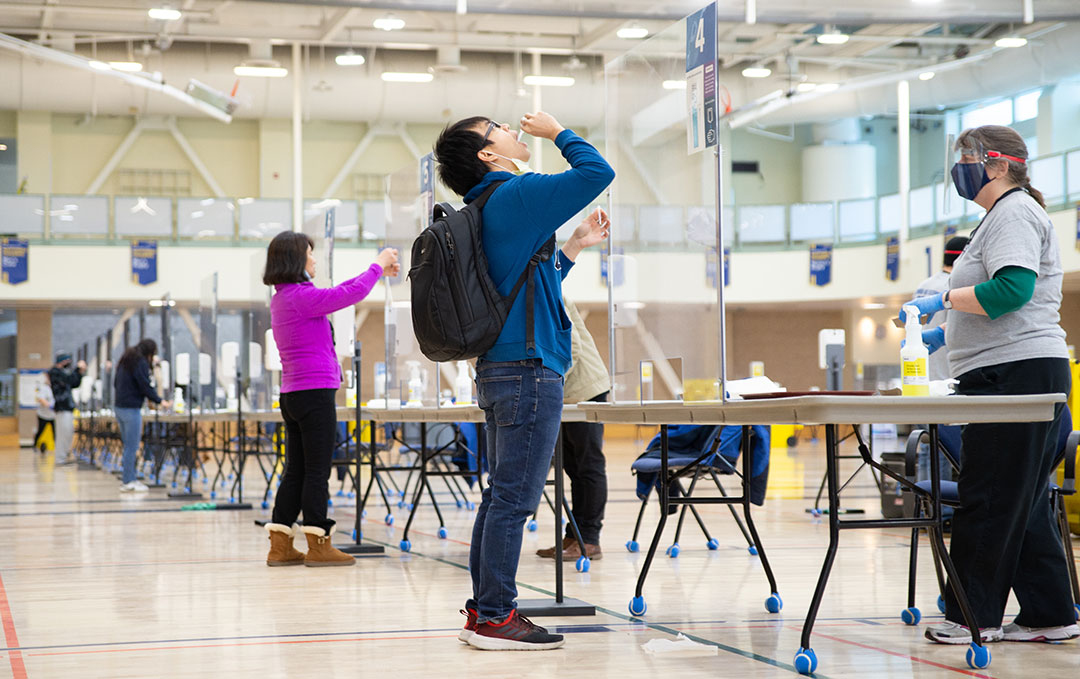
Nov. 17 — Yolo County drops back into the purple tier.
Nov. 17 — UC Davis announces it is participating in a pilot project of the California COVID-19 Notify app that can tell people of their potentially having been exposed to the virus.
DECEMBER 2020
Dec. 1 — COVID-19 testing is now required for entry to any Davis campus facility.
Dec. 8 — New Staff Emergency Fund starts taking applications after hitting initial fundraising target of $30,000.
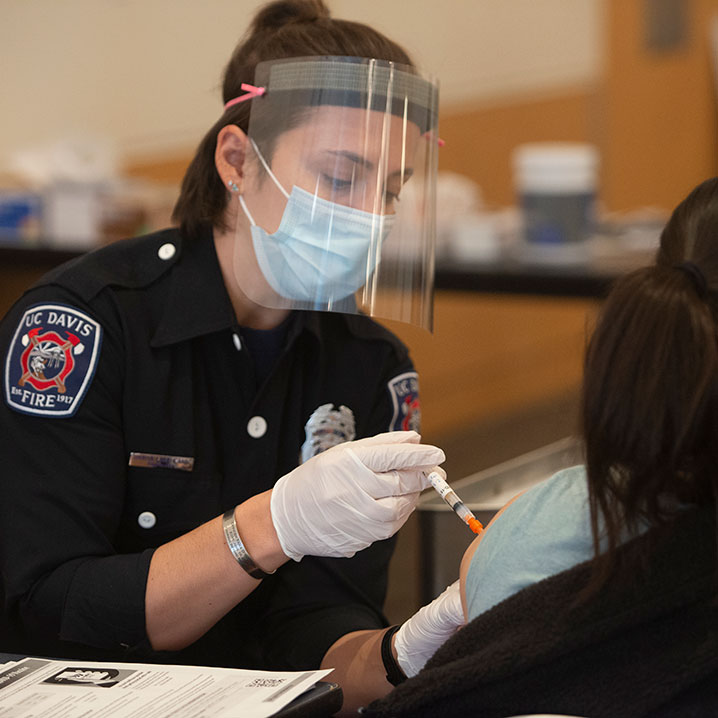
UC Davis firefighter Johnita Lanni-Cradit vaccinates a student at the campus clinic. (Gregory Urquiaga/UC Davis)
Dec. 10 — Yolo County will be subject to the state’s regional stay-at-home order, effective at 11:59 p.m.
Dec. 18 — Virtual fall commencement.
JANUARY 2021
Jan. 11 — The University of California announces all 10 campuses will resume in-person instruction in fall 2021.
Jan. 25 — California lifts statewide stay-at-home order.
FEBRUARY 2021
Feb. 1 — UC Davis opens Davis campus vaccine clinic for employees and students as they become eligible under the state’s phased distribution plan.
Feb. 26 — The Fall Planning Work Group, comprising representatives from several areas of campus leadership, holds its first meeting. They are addressing issues relating to the resumption of in-person instruction, research and on-campus activities in the fall.
Feb. 27 — The delayed 2020 football season is delayed again when Cal Poly, having had to pause its preseason practices over concerns surrounding the COVID-19 pandemic, postpones its visit to UC Davis Health Stadium. The Mustangs and Aggies are now set to play March 20 in UC Davis’ home opener.
MARCH 2021
March 12 — Healthy Davis Together encourages students to stay on campus or in town for spring break — and offers $75 grants to pay for projects and activities. Two-thousand-five-hundred grants will be distributed during the break.

